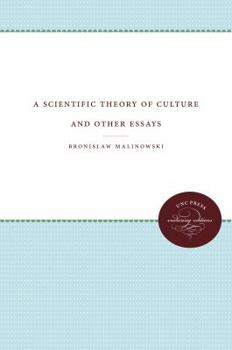A Scientific Theory of Culture and Other Essays
Select Format
Select Condition 
Book Overview
Malinowski presents in this book his definitive statement of the theory of functionalism. As the essential clue to the understanding of human behavior, primitive and civilized, he analyzes the functional principle that culture is an examination of the fundamentals of anthropology for the purpose of constructing a general system to explain the facts of culture by this principle.Originally published 1944.A UNC Press Enduring Edition -- UNC Press Enduring Editions use the latest in digital technology to make available again books from our distinguished backlist that were previously out of print. These editions are published unaltered from the original, and are presented in affordable paperback formats, bringing readers both historical and cultural value.
Format:Paperback
Language:English
ISBN:0807804339
ISBN13:9780807804339
Release Date:August 1990
Publisher:The University of North Carolina Press
Length:238 Pages
Weight:0.90 lbs.
Dimensions:9.2" x 0.6" x 6.1"
Customer Reviews
1 rating
Marriage and family mark the beginning of culture
Published by Thriftbooks.com User , 20 years ago
B. Malinowski's work constitutes an attempt to put anthropology on a scientific footing. His theory is very simple: anthropology is the study of the institutions, which are organized to satisfy human biological needs. An example: sex as a basic human need is organized, among other things, by marriage. His lists of basic human needs and of universal institutional types seem rather arbitrary. Basic human needs: metabolism (food), reproduction (sex), corporeal well-being (cleaning), security (shelter), activity (games), growth (of offspring), health (medecine). Universal institutional types: reproduction (marriage), territory (city), physiology (gender), spontaneous associations (secret clubs), profession (sorcerer), upbringing (learning), health (hospital). Anthropology studies also the functions of the different institutions as well as evolutionary aspects (transformations of institutions). The author makes also a distinction between basic and secondary (derivative) needs, which are economics, social control, education and political organization. Every culture has its own specific values, norms, motives and customs. The author gives every time a brief explanation of the different terms he uses. Malinovsky has also an important general ethic message: in anthropology all tribes, races or colours are equal. His analysis is still very topical: missionaries should change their behaviour. The West promised the colonized peoples equal rights, but it refuses to give them a share of world power and wealth and even national liberty. An essay discusses the works of James Frazer (The Golden Bough), which influenced mightily the theories of Freud. Today, these studies are considered as unscientific, although very interesting. Malinovski's work has also a very important flaw: he believes that the work of Kropotkin (cooperation) rendered Darwin's theory more or less obsolete. For a clear explanation of the influence of Darwinism on anthropological transformations, I recommend 'Genes, Mind, and Culture' by C. Lumsden and E.O. Wilson. Although sometimes out-of-date, this work is still a worth-while read.






